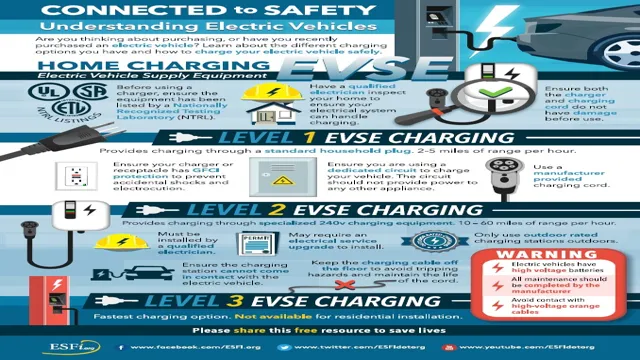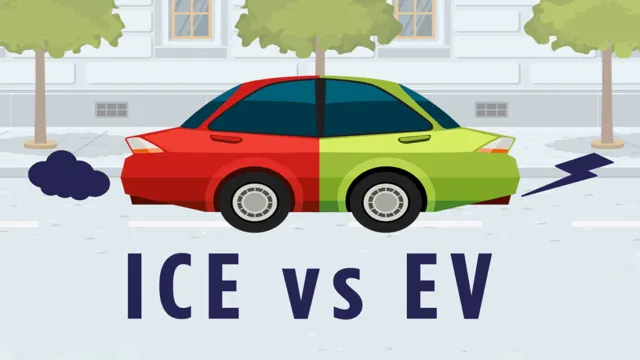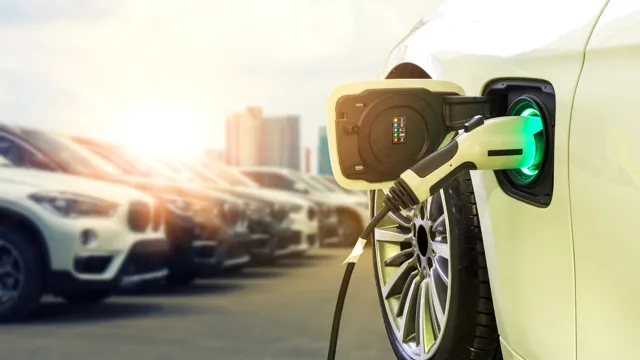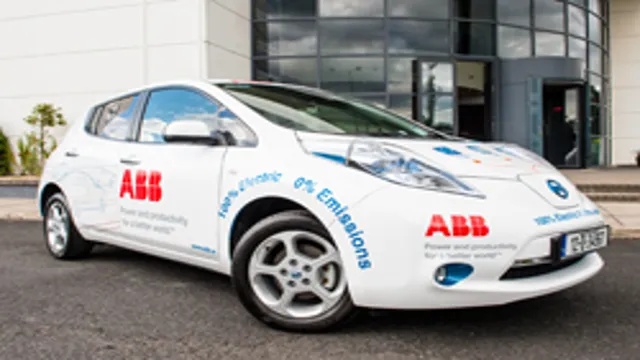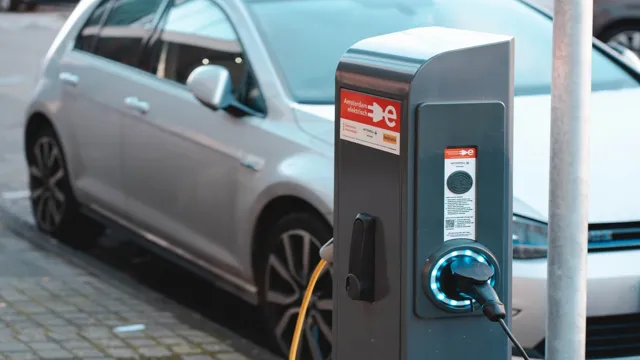Electric Cars: Safely Driving Towards a Sustainable Future – The Top Safety Benefits of Electric Cars You Need to Know About
Electric cars have become increasingly popular in recent years due to their impressive environmental benefits. However, these vehicles also offer numerous safety benefits that often go unnoticed. As more people continue to transition to electric cars, it’s important to highlight the many ways in which they increase safety both on the road and in the environment.
From reduced emissions to advanced safety features, electric cars are revolutionizing the auto industry and making our roads safer for everyone. In this blog post, we’ll explore some of the most significant safety benefits of electric cars and why they’re worth considering for your next vehicle purchase.
Lower Risk of Fire
One of the safety benefits of electric cars is the lower risk of fire compared to traditional gasoline-powered cars. Electric cars have a much lower chance of igniting in an accident because they don’t have a fuel system. Gasoline is highly flammable and can ignite easily, which can cause serious damage or even fatalities.
However, electric cars use battery-powered motors, which are much less prone to catching fire. Even in the event of a crash, the battery pack is designed to shut down and prevent a fire from starting. This is a significant advantage for electric car drivers, as they can feel more secure knowing they are driving a much safer vehicle.
Additionally, some electric cars feature systems that can alert drivers if the battery pack is at risk of catching fire, giving them ample time to take corrective action.
Electric cars have fewer flammable fluids than gas cars.
When it comes to safety, electric cars have a significant advantage over gas cars- they have fewer flammable fluids. Unlike gasoline-powered cars, electric cars don’t rely on highly combustible fuel. Instead, they use lithium-ion batteries that are well-protected and rarely catch fire.
Gas cars, on the other hand, carry highly flammable fuel that can ignite in an accident or even a minor collision. This risk is significantly reduced in electric cars, making them a safer option. While electric cars are not entirely immune to accidents, the risk of fire is much lower, giving drivers added peace of mind.
So if you’re looking for a safe and eco-friendly vehicle, an electric car might be just what you need!
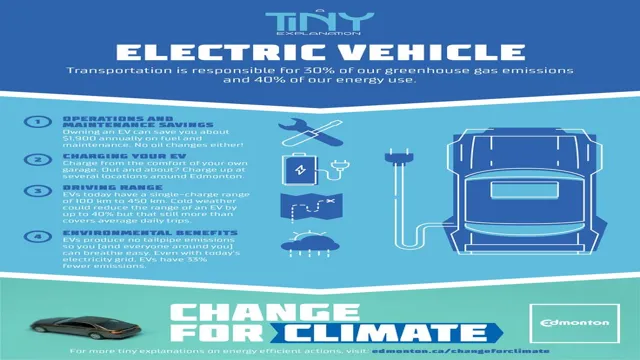
Electric car batteries are designed to prevent thermal runaway.
Electric car batteries have been designed to prevent thermal runaway, alleviating the concerns of many people about the risk of fire with these eco-friendly vehicles. Unlike conventional combustion engines, electric cars rely on batteries to power their engines, which have proven to be highly efficient and cost-effective. To ensure safety, the batteries are equipped with multiple safety features, including sensors, cooling systems, and shutdown mechanisms to prevent overheating.
Additionally, the lithium-ion cells that make up the battery are organized into modules, which are further grouped into larger packs. This design makes it easy to isolate and contain any potential malfunction and prevent it from spreading throughout the entire battery pack. In the unlikely event of a fire, electric vehicle fires are typically much less volatile and easier to extinguish than gasoline fires.
Thus, electric car batteries offer a lower risk of fire than gas-powered cars and are a safe option for environmentally-conscious drivers who are keen on reducing their carbon footprint.
Reduced Risk of Explosion
One of the key safety benefits of electric cars is the reduced risk of explosions. Unlike gasoline-powered vehicles, electric cars don’t rely on highly flammable fuel to power their engines. This means that in the event of a collision or any other accident, the risk of fire or explosion is significantly lower in electric cars.
Additionally, since electric cars don’t have a traditional internal combustion engine, they don’t require as many fluids and lubricants as gasoline-powered vehicles, which also minimizes the potential for flammable leaks or spills. As drivers and passengers, this gives us peace of mind knowing that we’re riding in a vehicle that has been designed with our safety in mind. It’s just one of the many reasons why electric cars are quickly becoming a popular choice for environmentally-conscious drivers looking for a safer, cleaner, and more sustainable way to get around.
Electric cars don’t have a fuel tank that can combust.
One of the biggest concerns when it comes to traditional gasoline-powered cars is the risk of explosion due to the highly combustible fuel tank. However, when it comes to electric cars, this is no longer a worry. Without a fuel tank that can combust, electric cars have eliminated this risk altogether.
This is thanks to the fact that electric cars run on batteries instead of gasoline or diesel, which means there’s no explosive material in transit. This is great news for drivers who are worried about the safety of their vehicle, and it’s also great news for the environment. By removing the need for dangerous fuel tanks, electric cars are not only safe but also eco-friendly.
So, if you’re looking for a car that’s safer for both you and the planet, an electric car is an excellent choice.
There is no risk of an explosion if an electric car is in an accident.
Electric cars have been gaining in popularity due to their reduced environmental impact and economic benefits. One of the most significant advantages of owning an electric car is the reduced risk of explosion in case of an accident, compared to traditional gasoline-powered vehicles. Electric cars use a lithium-ion battery, which is safer than the highly flammable gasoline used in conventional cars.
In the event of an accident, electric cars shut off their battery power automatically, minimizing the risk of a fire or explosion. In contrast, gasoline-based cars pose a greater threat, as they can catch fire or explode due to fuel leakage. Additionally, electric cars are constructed with reinforced safety measures, reducing the chances of severe damage or injury in case of an accident.
Overall, this means that electric cars not only have a lesser environmental impact, but are also safer on the road.
Improved Braking Technology
One of the major safety benefits of electric cars is the improved braking technology they come equipped with. Unlike traditional internal combustion engine vehicles, electric cars feature regenerative braking systems that capture energy normally lost during braking. This technology converts kinetic energy into electrical energy, which is then stored in the car’s battery for later use.
As a result, electric cars typically require less frequent brake pad replacement and offer greater control and stability while braking, which can improve overall safety on the road. Additionally, regenerative braking can help reduce the wear and tear on brake components, resulting in lower maintenance costs for owners. By harnessing the power of regenerative braking technology, electric cars not only provide a more eco-friendly driving experience but also help promote safer driving habits.
Electric cars have regenerative braking to improve safety.
Electric cars have revolutionized the way we think about transportation. Among the many benefits of electric cars is their improved braking technology. Electric cars have regenerative braking, which means that when you hit the brakes, the electric motor slows down, and the energy that is normally lost as heat during the braking process is captured and stored in the vehicle’s battery.
This not only improves the car’s efficiency, but it also reduces wear and tear on the brakes, making them less likely to fail in an emergency situation. The regenerative braking system also means that the car will come to a stop more quickly, making it safer for drivers and passengers. The improved braking technology in electric cars is just one of the many ways that these vehicles are changing the automotive industry.
With their state-of-the-art features and environmental benefits, it’s no wonder that more and more people are making the switch to electric cars.
Regenerative braking recaptures energy and reduces brake wear.
Regenerative braking is a game-changing technology that helps vehicles recapture energy that is lost during braking. This system converts the kinetic energy generated during braking into electric energy, which can be used to recharge the battery or power other onboard systems. Not only does this result in significant fuel savings, but it also reduces brake wear and tear.
By helping vehicles recover some of the lost energy, regenerative braking ensures that the energy used during driving is maximized, and emissions are minimized. Improved braking technology has come a long way in recent years, with regenerative braking being one of the most impressive advancements. This system is a brilliant example of how energy can be harnessed in a sustainable manner, and most importantly, how it can help reduce the harmful impact of vehicles on the environment.
With regenerative braking technology now available in many vehicles, drivers can enjoy a more efficient and eco-friendly driving experience. So, the next time you hit the brakes, remember the power of regenerative braking, and appreciate how this technology helps protect our planet.
Lower Center of Gravity
One of the many safety benefits of electric cars is their lower center of gravity. Unlike traditional gas-powered vehicles, electric cars have their heavy battery pack located at the bottom of the car, which keeps the vehicle’s center of mass closer to the ground. This design feature provides several advantages, including better stability and handling, particularly in sharp turns or during sudden maneuvers.
Additionally, the risk of rollovers is significantly reduced with electric cars due to their lower profile. Overall, this design feature contributes to the safety and stability of electric cars and makes them an excellent choice for those who prioritize safety while still enjoying efficient and eco-friendly transportation.
Electric car batteries are placed in the floor for balance.
One of the advantages of electric vehicles is the way their batteries are placed in the car. Instead of being located in the front of the vehicle like in a traditional car, electric car batteries are placed in the floor for balance. This means that the car’s center of gravity is lowered, making it more stable and less likely to roll over.
Additionally, the battery’s placement gives the car a better weight distribution, improving its handling and overall performance. It’s like having a keel on a boat that helps it stay upright and balanced in the water. In the end, the placement of the battery is a crucial design element that ensures the electric vehicle remains safe and enjoyable to drive.
Lower center of gravity reduces risk of rollovers.
Lower center of gravity is a vital aspect in reducing the risk of rollovers in vehicles. It is the measurement between the vehicle’s center of mass and the ground. The lower the center of gravity, the more stable the vehicle will be, particularly in sharp turns or fast movements.
A car with a high center of gravity, like SUVs or minivans, has an increased chance of overturning due to their elevated seating and bulkier designs. In contrast, sports cars or sedans, which sit lower to the ground, have lower centers of gravity that enable them to minimize the likelihood of rollovers. Therefore, vehicles with lower centers of gravity are ideally suited for high-speed maneuvers and have a better ability to hold the road in any driving conditions.
In a nutshell, the lower the center of gravity, the better the vehicle’s handling characteristics, which is one of the crucial considerations for a car buyer.
Conclusion
In conclusion, the safety benefits of electric cars are nothing short of electrifying. From their advanced traction control to their low center of gravity, electric cars offer a safer and more secure driving experience. And let’s not forget the reduced risk of fire and explosion, thanks to the elimination of flammable gasoline.
So if you’re looking for a ride that puts safety first without sacrificing style or performance, an electric car might just be the spark you need.”
FAQs
What are some safety benefits of electric cars?
Electric cars have several safety benefits, such as lower center of gravity, instant torque, and silent operation. This contributes to better handling, quicker acceleration, and reduced noise pollution, making them safer for both drivers and pedestrians.
Are electric cars safer than gasoline cars?
Electric cars can be considered safer than gasoline cars due to their lower center of gravity, fewer moving parts, and advanced safety features. Additionally, electric cars do not have a fuel tank, which eliminates the risk of explosion in case of a collision.
How do electric car batteries affect safety?
Electric car batteries are designed and tested to ensure safety. Most electric cars have a sophisticated battery management system that regulates the temperature and prevents overcharging or overheating. However, in case of a severe accident, electric car batteries can pose a risk of fire or electrocution.
Do electric cars require less maintenance, and is it safer?
Electric cars require less maintenance than gasoline cars because they have fewer moving parts and do not require oil changes. This not only reduces the frequency of maintenance needs but also reduces the risk of accidents due to mechanical failure. However, it is still important to follow the manufacturer’s recommended maintenance schedule for optimal safety.
